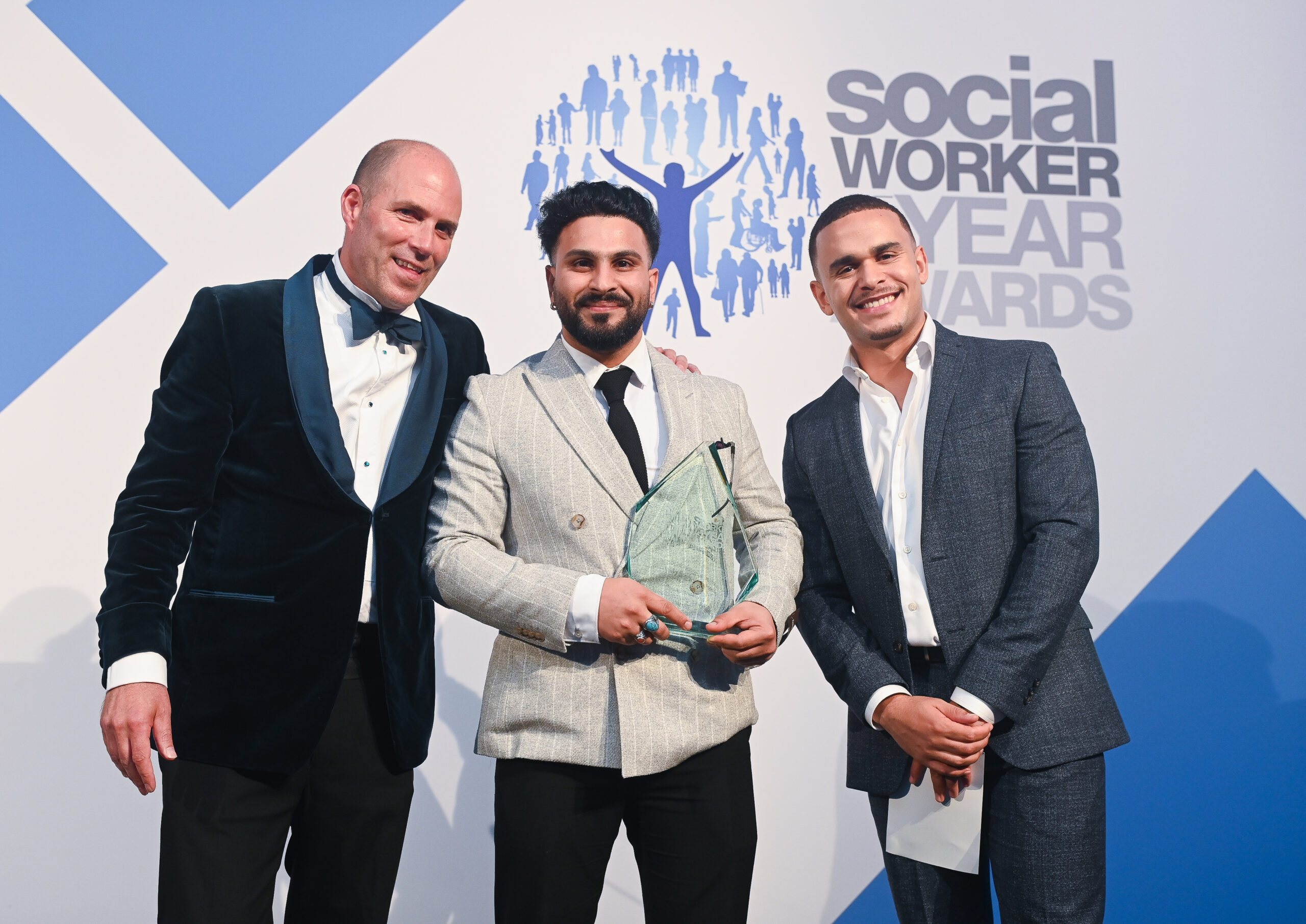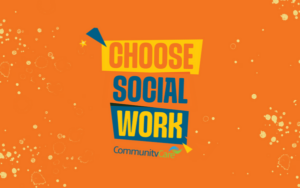
At last year’s Social Worker of the Year Awards, Omaid Badar won both the children’s practitioner and overall winner’s prizes, with one judge describing him as “everything the profession is about when it’s at its best”.
The 29-year-old Kirklees Council social worker has overcome more than most on route to those accolades.
Omaid was born in Afghanistan, then ravaged by civil war, became a refugee and, aged 14, made a perilous journey to England, enduring extreme hardship in pursuit of a safe haven.
In an interview with Community Care, he opened up about his journey from being a young boy in Afghanistan to a social worker in England, his approach to working with children and how he handles those difficult days.
You made a very daunting journey at age 14 from Pakistan to England. What was your experience like of being a refugee?
You first need to understand that I was born in 1994 in Afghanistan, a war-torn country. I was a month old when we lost our dad. I don’t even know if he held me because, as a one-month-old, what could you possibly remember?
That situation forces you to leave your homeland, become a refugee. We travelled to Pakistan, where we lived in refugee camps and areas that were so dangerous the police were not allowed in.
It got to a point where my mum was really worried for my safety [and decided to send me away]. At the time, I had lost many people and I didn’t want to lose her too. I was going out, seeking a safe haven, but was I going to see my mum again? Was I going to be able to hug her again?
And it wasn’t a pleasant journey. Most of the time we weren’t told where we were going. We would be stuffed in cars, inflatable boats and vans, sometimes 80 people, squeezed in together, one on top of the other. There was no room to breathe.
At times, we would be walking at night so the border police wouldn’t see us, because they would shoot at us. It’s not an easy journey, you have to accept that you might not make it to the next day.
There were days when we had no food and survived just on water. And when they did bring food for us, it would be stale bread that would be so hard to crack we would dip it in yoghurt to break it.
I travelled that way to Iran, Turkey, Greece, Italy and France, and eventually reached Bradford, England.
I had been told to seek a police officer the moment I arrived, but I can’t say my first encounter was a good one. They did speak to an interpreter and understood why I was here, but then they put me in a cell.
It was so cold. My shoes and clothes were all ripped and the only thing they gave me was a blanket full of holes that didn’t keep me warm. But in the morning, a social worker came in.
I still remember her name, Lucy. As soon as she saw me, she hugged me. I think that was the first time I felt emotional warmth and I just cried.
She took me to social services and then shopping at ASDA for clothes. She quickly found a temporary placement for me and then I moved to a children’s home and my schooling was arranged.
What was your time in care like? How has it informed your practice?
My experience in care had its ups and downs. I faced bullying and discrimination but also received support and care from some staff members. These experiences shaped my approach to social work – respecting cultures and being honest and committed to the children I work with.
Lucy wasn’t my social worker for long. After her, there were a few temporary ones for a few months and then I didn’t have a social worker for a long time, probably because I wasn’t creating problems.
But, at the same time, I realise now that you’re supposed to see your children once every six weeks.
I do that for the children that I work with. And if they need to see me more, I will make time and go visit them again because they need that.
I never got the answer why a social worker never came to see me. I am grateful to Bradford, but I would advise social workers to be committed to their children, to be open and honest with them.
Tell them if there’s something you can’t do, tell them that you’ll go and see if you can find alternative ways, but don’t promise them because children hold you to those promises. And then if you can’t fulfil that promise, they won’t trust you.
What inspired you to become a social worker?
My key worker, Jerry Phillips. He’d always find me and speak to me when he was on a shift, bring me books to read, come to my school meetings and review meetings.
He was patient with me, made me understand that nothing should be taken for granted. ‘Today you have support, tomorrow you won’t, so make sure you learn how to be independent,’ he’d say.
He taught me how to cook and was my go-to person. He always used to talk about school, education, standing up for your rights. But if you do anything wrong, put your hand up and say that. There’s always a way out.
When he asked me why I wanted to be a social worker I said, ‘What you did for me, I want to do for every kid out there, because you changed my life’.
He made me believe in myself, had faith in me, was committed to me. He was open and honest with me. I want to be that role model for the children out there. To this day, I still see him. He came to my graduation and he was proud.
What is your approach to social work?
I have just completed my fifth year as a children’s social worker and I’m loving it. I come to work and I’m always in a good mood because I know I’m here to help change families’ lives.
My approach is to always explain what my role is – because there are misconceptions about what a social worker does – and have an open mind.
On paper, a person can look like a monster, but when you visit them, you realise they might have never been given a chance. And change doesn’t happen overnight, it takes us [social workers] being committed.
As a social worker, my values are to be committed to the people I’m working with, to be honest and open with them and to create an environment where they feel comfortable talking to me, they feel listened to and not judged.
I think clarifying that you are not here to take the children helps; [I] explain which plan they’re going to be on and whether it’s consent-based.
I say to them: ‘There’s nothing we cannot work on. But we need to communicate and work around it. If I can’t do anything in my power, there will be other services that can come on board and help you. I’m here to support you and help you get to where you need to be because you don’t want social workers to be involved in your life all the time.’
They’ll naturally be worrying about what’s going to happen. You need to reassure them so they feel that you’re working together – involve them in decision-making and ensure you’re doing things with their consent, not without.
I think because I’ve been through it, I can also relate to the children more. I can understand what is happening to them, provide them with what they need from me and work with them using a restorative approach.
How do you handle difficult days?
After a difficult day, I always take a step back and reflect.
If I’ve tried everything and it didn’t work, let’s get another fresh pair of eyes to see if there are other ways to deal with the situation.
For me, supervision is like therapy. Whenever we miss a [meeting], I will put on another date straight away. You have to be accountable, you can’t just leave everything to your manager.
There, you can challenge your hypotheses, make informed decisions, identify other forms of support. There are things that you might not know that your manager might know and give you advice. Peer supervision with your peers, formulation meetings and multi-agency meetings [also] help.
What also helps me is that when I go home, I’ll start cooking. Cooking is therapy for me. I’ll cook my favourite dish or go to the gym and just try to switch off because, even when I’m going on holiday, sometimes I keep thinking, ‘Oh will that child be safe?’.
My team also helps a lot. If someone is struggling with a case, we share responsibilities to take some pressure off.
Working this way means we don’t have many people going on sick leave or stressing over caseloads. I’ve been in practice for five years and haven’t taken a sick day.
I even come in on Eid, choosing to give that time to my children rather than celebrating.
What is your ambition as a social worker?
I plan to go into the United Nations and be an ambassador for children. A lot is happening in the world and, as a social worker, I cannot just stay quiet, because my job is safeguarding. It hurts me to see children in the world at risk. It hurts me because I’ve been through it.
I’ve been blessed to have an opportunity to grow and I want to be a voice for the children and families that I work with because their lived experience is all that matters.
All the children out there deserve to live peacefully, to have an opportunity to live in an environment that is free from emotional abuse, physical abuse, sexual abuse, criminal abuse. Such traumatic events stay with you for a lifetime.
My traumatic events have stayed with me, but I’m fortunate enough to have found resilience in that and have people that I can speak to. But children out there are going through hardship and difficulties without shelter, education, food or financial stability. It’s hard.
I want to be able to do something so they can be where I am.
Choose Social Work
 We have highlighted Omaid’s story as part of our Choose Social Work campaign, which aims to champion the brilliant work social workers do every day, inspire the next generation of practitioners and counteract the negative media coverage of the profession.
We have highlighted Omaid’s story as part of our Choose Social Work campaign, which aims to champion the brilliant work social workers do every day, inspire the next generation of practitioners and counteract the negative media coverage of the profession.
You can find out more on our campaign page and by checking out previous stories from Choose Social Work:






 Family help: one local authority’s experience of the model
Family help: one local authority’s experience of the model  ‘I spent the first three months listening’: how supportive leadership can transform children’s services
‘I spent the first three months listening’: how supportive leadership can transform children’s services  How senior leaders in one authority maintain a culture of excellence
How senior leaders in one authority maintain a culture of excellence  How staff support ensures fantastic outcomes for children and families
How staff support ensures fantastic outcomes for children and families  Workforce Insights – showcasing a selection of the sector’s top recruiters
Workforce Insights – showcasing a selection of the sector’s top recruiters 

 Facebook
Facebook X
X LinkedIn
LinkedIn Instagram
Instagram
Truly inspirational story of a great social worker. i would say that his lived experienced shaped his outlook into social work. A well deserved award. Well done Omaid!
The Man is an inspiration.
I’d like to leave a comment about your survey which I did participate in.
I don’t think it asked the correct questions nor gave the correct options for the responses.
*Should social workers’ achievements deserve recognition?
Answer Yes or No
*Should that recognition of social workers achievements include awards under the UK honours system?
Answer Yes or No
**If you answered no, is is because it is an outdated system that is contrary to social work values.
Answer Yes or No
You didn’t permit response to recognise that all Social Work Achievements should be recognised.
I hope some of whom you work with with, may be inspired by your journey, just as you were inspired by Jerry, who appears to have been a great social worker.
I hope you got to meet your mum.
Thank you for sharing this story. It is inspirational and motivational. Some days in social work it’s very hard to feel great but this has really encouraged me. The work we do is so important.
Great Inspiration
Just read Omaid’s story and how he progressed to be Social Worker of the year.
What an incredible young man.
This goes to show us that Refugees just need the opportunity when they are given a chance in life.
They have been through so much in their lives that they know how to show gratitude.
They should be welcomed to the Country they wish to seek refuge in.
Well done Omaid and the families that you are working with are very lucky to have such a caring professional.
I hope you have had the opportunity to be reunited with the family you left behind.
Omaid’s story is truly inspirational and evokes our passion for the profession as well as some very strong emotions concerning his personal history. At the same time, this award raises some difficult questions around the use of such awards to effectively virtue-wash the reputations of the Social Work Awards’ chief sponsors, a growing £multimillion social work recruitment empire and it’s inordinately wealthy private-equity owners, not to mention the political lobbying and PR firm that runs the awards on their behalf.
It’s essential that we as social workers maintain critical space for the expression of disquiet about such things.
Completely agree with you Christian around the use of such awards.